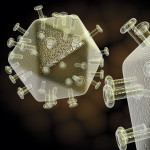Gilead Sciences’ experimental integrase inhibitor elvitegravir appears to be working well in a Phase III clinical trial involving treatment-experienced patients, according to a March 23 press release by the company. Though the study will last about two years (96 weeks), Gilead says the study’s primary goal has been met: comparable results between patients receiving either elvitegravir or Merck’s approved integrase inhibitor Isentress (raltegravir) for 48 weeks.
Both elvitegravir and Isentress are being used as part of regimens that includes a Norvir (ritonavir)-boosted protease inhibitor and a second antiretroviral (ARV) agent. Formal interim results for peer review at a scientific conference or in a medical journal have not yet been reported.
Thus far, the development of elvitegravir has focused on its safety and efficacy in treatment-experienced people living with HIV, notably those with virus still sensitive to first-generation integrase inhibitors (such as Isentress and elvitegravir). A Phase II study of elvitegravir in people who have never taken ARV therapy is under way.
Elvitegravir must be combined with a boosting agent to ensure adequate drug levels in the body. Boosting allows for once-daily dosing, whereas Isentress—which does not require boosting—must be taken twice daily.
Elvitegravir is also being studied as part of Gilead’s investigational fixed-dose, single-tablet “Quad” regimen. The Quad contains four Gilead compounds in a fixed-dose, single-tablet: elvitegravir; cobicistat, a boosting agent being studied as an alternative to low-dose Norvir; and Truvada (emtricitabine/tenofovir). The Quad is currently in Phase III testing. In addition, cobicistat is being evaluated as a stand-alone boosting agent to be used with non-Gilead ARVs.
The primary endpoint, or goal, of the Phase III study being conducted by Gilead was “non-inferiority” at week 48 of elvitegravir compared with Isentress. Responses at 48 weeks of elvitegravir met the statistical criteria of noninferiority as compared with Isentress, based on the proportion of subjects who achieved and maintained undetectable viral loads.
Gilead also noted that discontinuation rates due to adverse events were comparable in both groups of the study.
“We are very pleased to have achieved the primary endpoint in this clinical trial, as data from this study will support regulatory filings for elvitegravir as well as Gilead’s investigational Quad pill,” said Norbert Bischofberger, PhD, chief scientific officer at Gilead. “By analyzing these data now we will be in a better position to advance filings as quickly as possible once data from subsequent Phase III clinical trials in our Quad development program become available later this year.”
Gilead plans to report the 48-week safety and efficacy data at a conference later this year.






1 Comment
1 Comment